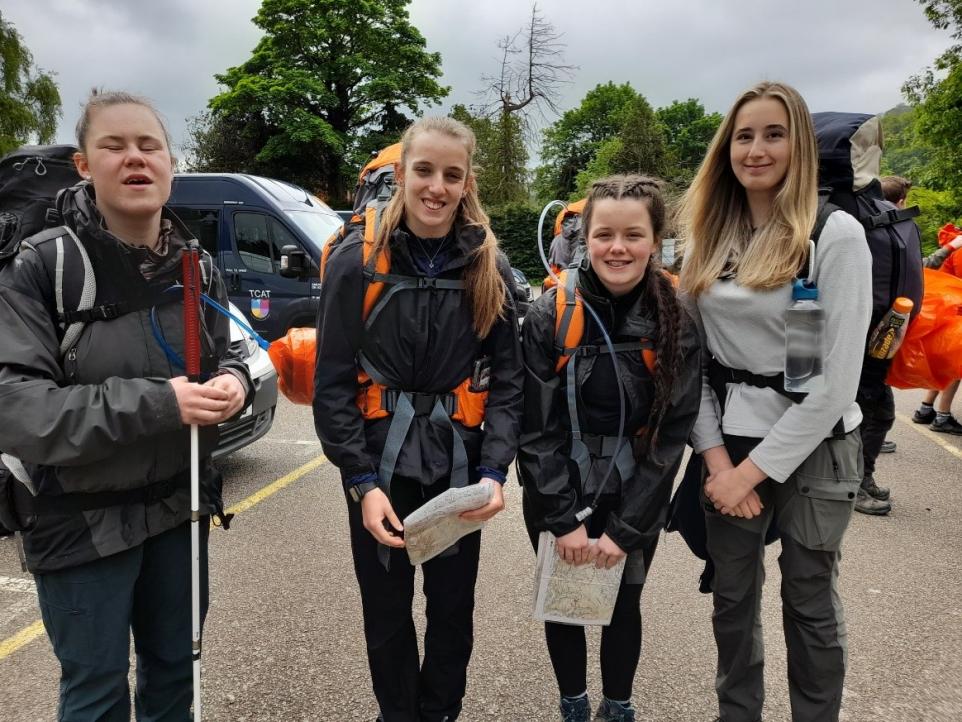Eimear won’t let her visual impairment stand in the way of completing her expedition

14-year-old Eimear has achieved her Bronze Award and recently completed her Silver Expedition at Bridgewater High School. Something, she says, that helped her discover a new level of independence. Eimear has a visual impairment and describes the biggest challenge on the expedition being navigating the uneven terrain. With help from the DofE’s Resilience Fund and Warrington Borough Council’s Direct Payments Award, Bridgewater High School were able to support Eimear with extra equipment on her expedition, including funding for a sighted guide. In addition, Eimear bought two walking poles which she used instead of her cane during the expedition. She says that having additional needs should never stop you from reaching your goals. Read her story.
“For both of my expeditions the equipment I received was really helpful. I had a walkie talkie that I kept in my tent so I could talk to a member of staff if I needed anything. I also had a boiling aid for my Trangia, which was a metal disc with bridges that rattles once the water starts to boil. I also bought some extra equipment for myself, including two walking poles which really helped me be more independent and I adapted really quickly and soon became one of the fastest in the group! During my Bronze Expedition we were mostly navigating through fields, but for Silver the terrain was more challenging and there were more hills. I had a sighted guide for both expeditions, but I was definitely more independent on my Silver, and that felt really rewarding. You don’t want to be guided all of the time, and for some of the paths on our Silver, I couldn’t be because they were too narrow.”
“The biggest challenge was probably navigating uneven terrain, especially when there were loose rocks and the ground would move. The downhill was often harder than the uphill, plus there were times where we did stray and at one point ended up crawling under some trees! The other challenge was just staying motivated to keep going, but we enjoyed it and all helped each other. I did lots of preparation beforehand, I’d walked miles with my family to build up my fitness level, so by the time I did my expedition I was feeling pretty confident. I enjoyed motivating the team and I tried to keep my backpack really organised, although this did slowly decline as the days went on! With the tent poles, they unfold similarly to my cane, so I felt really familiar with this and helped a lot with setting up the tents at the campsite.”
“Although there were challenges around the access of it, personally I really enjoyed the route. But to encourage more people to get outdoors, I think it would be good to have routes recommended for people with a visual impairment, so they can follow an easier path. I also think it would be good if they could make the styles that you climb over all the same so they are more familiar, as every one was different so each time I had to approach it differently. One thing that really helped me on my Bronze Expedition was that beforehand, my DofE Leader had walked the route and created an audio guide for me which describes things like the smell in a particular area or the terrain in a field. I usually have a BrailleNote with me but this is quite a heavy piece of kit and would be difficult to take on the expedition, so having an audio guide was really helpful.”
“I can’t see but I don’t think that should ever stop me doing anything. To someone else with a visual impairment, I’d say just give DofE a go because it has so many benefits. I was nervous about starting my Bronze, but I was so glad I challenged myself to do it, it increased my resilience and I’ve used skills that I didn’t even know I had before I started my DofE. I’m now thinking of doing Gold.”
Through the Resilience Fund, the DofE has been able to support South Shore Academy with vital funding which has so far given 300 young people opportunities to start their DofE Awards. Learn more about The Resilience Fund here.




